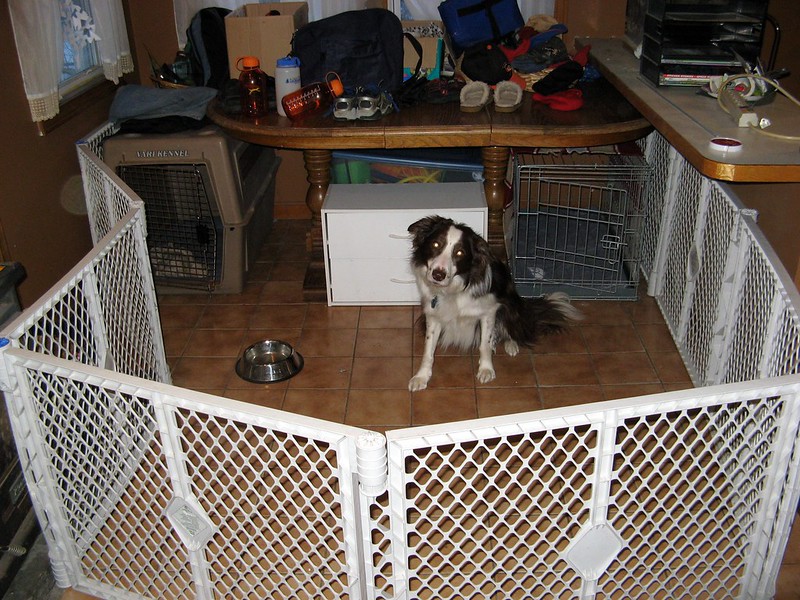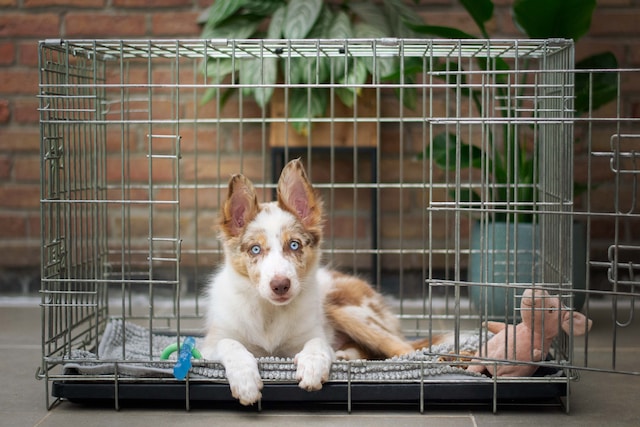So you’ve decided to bring home a cute little furball, eh?
Well, congrats on your newest source of never-ending entertainment and chaos! But hold up, before you go on celebrating, you gotta figure out how to keep your puppy out of trouble when you’re not around.
Now, there are two main contenders in this corner – the Puppy Pen and the Crate. It’s like a boxing match, but cuter! In the red corner, we have the Puppy Pen – spacious, roomy, and perfect for those pups who need some room to roam. And in the blue corner, we have the Crate – cozy, snug, and ideal for those pups who like to snuggle up and feel safe.
So, which one is the champ?
Let’s get started,
Puppy Pens vs Crates: What’s the Difference?
A puppy pen is typically a larger, enclosed area that can be either portable or stationary. These pens allow your puppy to move around freely and have some space to play and explore, while still being contained to a specific area.
Puppy pens are often used for outdoor playtime or indoor training sessions, and can be easily moved from room to room or taken with you when traveling.
On the other hand, a crate is a smaller, enclosed space that provides your puppy with a sense of security and comfort. Crates are often used for sleeping or when you need to leave your puppy unsupervised for short periods of time.
They can also be helpful for potty training, as dogs generally do not like to soil the area where they sleep.
Pros and Cons of Using Puppy Pen

Photo by WoofBC
Puppy pens can be a great way to give your furry friend more space and freedom while keeping them safe and contained. However, like any confinement method, there are pros and cons to using a puppy pen.
Pros of Puppy Pens
Listed below are the significant advantages of using a Puppy Pen:
| Pros of Puppy Pens | Cons of Puppy Pens |
| Provides a safe and secure space for your puppy | Potential for escape |
| Room for growth | Chewing on objects |
| Room for exercise | Separation anxiety |
| Less confinement compared to a crate | |
| Can be used for multiple purposes |
Let’s dig a little deeper.
Provides a safe and secure space for your puppy
One of the enormous benefits of using a puppy pen is that it provides more space for your furry friend to move around and play.
This is especially important for active puppies that need room to burn off energy without the danger of chewing on something they shouldn’t or getting into other hazards around the house.
Room for Growth
Puppies grow quickly, and a puppy pen can provide a space to grow with them. You can expand the pen as they get bigger to give them more room to move around.
Room for Exercise
By providing a larger area for your puppy to play and move around in, a puppy pen can help to ensure that your puppy gets enough exercise and physical activity.
Less Confinement
Unlike a crate, a puppy pen allows your furry friend to move around more freely. This can help prevent boredom and anxiety that can come from feeling confined.
Can be used for multiple purposes
Puppy pens can be used for a variety of purposes, including indoor and outdoor playtime, training sessions, and as a safe space for your puppy to rest and relax.
Cons of Puppy Pens
The significant disadvantages of using a Puppy Pen are as follows:
Potential for Escape
Depending on the size and agility of your puppy, there is a possibility that it could escape from the pen. It’s essential to make sure that the pen is sturdy and secure.
Chewing
Puppies love to chew, and if they’re left in a puppy pen with toys and other items, there is a possibility that they could chew on things they shouldn’t.
Separation Anxiety
Some puppies may experience separation anxiety when left in a puppy pen, especially if they’re used to being around people all the time.
A puppy pen can be a great way to provide more space and freedom for your furry friend, but it’s essential to consider the pros and cons before deciding. If you decide to use a puppy pen, ensure it’s secure, provide appropriate toys and chews, and introduce it gradually to your puppy to make it a positive space for them.
Pros and Cons of Using Puppy Crates

Puppy crates are a standard confinement method pet owners use to keep their furry friends safe and secure. However, there are specific pros and cons of using puppy crates. Let us dig into some of them:
| Pros of Puppy Crates | Cons of Puppy Crates |
| Provides a safe and secure space for your puppy | Can be too confining if used excessively or for long periods of time |
| A valuable tool for potty training | Requires proper sizing to ensure your puppy’s comfort and safety |
| Convenient for travel | May not work for every puppy |
| Can reduce anxiety and promote relaxation |
Let’s dig a little deeper.
Pros of Puppy Crates
Here are a few benefits of utilizing a crate for your puppy:
Security
A puppy crate provides a safe and secure space for your furry friend to rest and play without the danger of getting into trouble or injuring themselves.
Potty Training
A puppy crate can be a valuable tool for training your furry friend, as dogs generally don’t like to soil the area where they sleep.
Travel
Puppy crates are a convenient way to transport your furry friend safely, whether you’re going to the vet, on vacation, or just running errands.
Reduced Anxiety
A crate can provide a familiar and safe space for your furry friend to retreat when they’re anxious, which can help to reduce stress and promote relaxation.
Cons of Puppy Crates
Puppy crates are truly advantageous, however, there are some cons to using crates that should be taken into consideration before deciding to use one.
Can be too confining
While a crate can provide a safe and secure space for your puppy, it can also be too confining if used excessively or for long periods of time. This can lead to boredom, frustration, and restlessness.
Requires proper sizing
It’s important to make sure that the crate is properly sized for your puppy to ensure their comfort and safety. A crate that is too small can be uncomfortable and a crate that is too large can allow your puppy to use one area as a bathroom and another area to sleep.
May not work for every puppy
Some puppies may feel anxious or uncomfortable in a crate, and may require alternative methods of confinement or training.
Puppy crates are a great way to keep the puppies safe and, most importantly, ensure they are not anxious or bored. It is vital to consider the size limitations of puppy crates when introducing the same.
So, Which is Better – Puppy Pens or Crates?
Now comes the ultimate answer to the question of which is better, puppy pens or crates or which type of crate and playpen set-up will serve the puppy better.
Well, the answer to this is entirely subjective. Puppy crates and pens are great for puppy confinement but are best suited under certain circumstances.
Puppy Pens are best suited:
- When you want to restrict the access of your pet in your house so that they don’t destroy stuff
- It is best when you need to leave your puppy alone for a long time
- They are portable and ideal for ensuring that the pet gets enough space for hindrance free movement and exercise
Puppy Crates are best for the following situations:
- When confining the pet for a short period
- During the days of housetraining
- For uninterrupted and peaceful sleep of the furry babies
Ultimately, the decision between a puppy pen and a crate depends on your puppy’s individual needs and your own lifestyle.
For example, if you have a small apartment and limited space, a crate may be a better option. However, if you have a larger home and want to give your puppy more room to play and explore, a puppy pen may be more suitable.
It’s important to weigh the pros and cons of each option and consider your puppy’s comfort and safety when making your decision.
The ideal combination is to use the crate at night and playpen during the day. This matches the specific daily needs of the dogs and helps them grow better.








